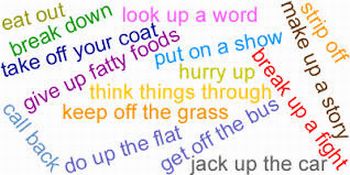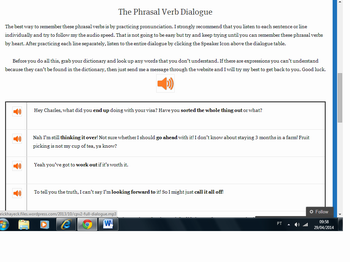20/05/2014
Eliana Dias e Lazuíta Goretti de Oliveira
| Modalidade / Nível de Ensino | Componente Curricular | Tema |
|---|---|---|
| Ensino Médio | Língua Estrangeira | Competência comunicativa: componentes linguísticos, sociolinguísticos e pragmáticos |
| Ensino Médio | Língua Estrangeira | Competência pluricultural: língua como meio de acesso às manifestações culturais |
| Ensino Médio | Língua Estrangeira | Produção escrita |
| Ensino Médio | Língua Estrangeira | Compreensão oral |
| Ensino Médio | Língua Estrangeira | Compreensão leitora |
| Ensino Médio | Língua Estrangeira | Produção oral |
O que o aluno poderá aprender com esta aula
os alunos conhecerão e poderão fazer uso de diversos phrasal verbs que fazem parte de diversas situações comunicativas cotidianas de nativos da língua inglesa
Duração das atividades
Conhecimentos prévios trabalhados pelo professor com o aluno
Os alunos deverão ter um bom conhecimento da língua inglesa, no que se refere a sua estrutura básica, como sujeito, verbo e complemento.
Estratégias e recursos da aula
- recursos multimídia;
- vídeos;
- imagens veiculadas na internet;
- aula expositiva;
- prática oral e escrita;
- atividades xerocopiadas;
- atividades online;
- música
PHRASAL VERBS

1.0.0l10.1447.5264.0.7242.17.13.4.0.0.0.209.1511.7j4j2.13.0....0...1ac.1.42.img..2.15.1172.3muJu-DyNMQ#facrc=_&imgdii=_&imgrc=tu6RvY7FotYKQM%253A%3B0EbA2gGVg-yT5M%3Bhttp%253A%252F%252Fwww.michellehenry.fr%252Fmishmash.gif%3Bhttp%253A%252F%252Fwww.michellehenry.fr%252Fphrasal.htm%3B400%3B200
(acesso em 29.04.2014)
MÓDULO 1
Atividade 1

%252F%252F3.bp.blogspot.com%252F-tu1aAKMQmDk%252FUFilNjPTj4I%252FAAAAAAAACGI%252FAsl6YqUlVo4%252Fs1600%252Flets-sing.jpg%3Bhttp%253A%252F%252Felblogdeprp.blogspot.com%252Fp%252Flets-sing.html%3B766%3B482 (acesso em 28.04.2014)
No laboratório de informática, introduza a aula colocando o vídeo da música "Another Day in Paradise" de Phil Collins, em que aparecem alguns phrasal verbs, tema da aula. Peça para que os alunos acompanhem a música, cuja letra aparece no próprio vídeo.
Em seguida, pause o vídeo a cada trecho e peça para que os alunos observem os seguintes verbos:
CALL OUT
WALK ON
LOOK BACK
BE MOVED ON
FIT IN
Chame a atenção para o fato de que são verbos que aparecem acompanhados de preposições e, por isso, são conhecidos por Phrasal Verbs. Pergunte aos alunos a tradução dos verbos e, em seguida, com a ajuda de um dicionário online, peça para que procurem a tradução dos verbos destacados na música, confirmando ou não as suas intuições, quanto ao significado dos verbos.
Sugestão de dicionário online: http://dicionario.babylon.com/rede%20social/ (acesso em 01.05.2014)
Atividade 2
Continue a apresentação do assunto com o seguinte texto, que poderá ser projetado no datashow. Peça para que um dos alunos realize a leitura em voz alta.
O que são phrasal verbs?

Phrasal verbs são combinações de palavras formadas por um verbo e uma preposição ou um verbo e um advérbio. São também conhecidos como two-word verbs e outros nomes estranhos. São exemplos de phrasal verbs combinações como as que seguem abaixo:
get up (levantar) - give up (desistir) - look forward to (aguardar ansiosamente por) - look for (procurar) - look into (investigar) e muito mais.
Veja que não temos como entender o significado destas combinações traduzindo cada palavra isoladamente. É preciso saber o significado e o uso do conjunto.
Os falantes nativos de inglês aprendem phrasal verbs da mesma forma como nós aprendemos gírias e expressões na nossa língua. Eles não decoram listas e mais listas de phrasal verbs. Eles simplesmente escutam, usam com frequência, continuam usando e assim vai. Faz parte do dia a dia deles!
Please sit down and wait for the doctor.
Wake up! You’re late for school! She gave up smoking last year.
Ana took her clothes off and had a shower.
Hurry up! We’ll miss the flight!
Atividade 4
Phrasal verbs dialogue
Entregue o seguinte material xerocopiado e organize os alunos em duplas. Disponibilize um tempo de aproximadamente 15 minutos para que realizem uma leitura silenciosa.
Peça para que, em seguida, sublinhem todos os phrasal verbs encontrados no diálogo. Circule pela sala, tirando as dúvidas em relação a pronúncia correta das palavras e ao vocabulário. Possibilite acesso a dicionários eletrônicos ou impressos.
Escreva no quadro todos os phrasal verbs destacados pelos alunos. Promova uma discussão sobre o significado de cada um deles, atentando-se, sempre, para o contexto em que foram usados.
Finalmente, peça para que cada dupla encene o diálogo e apresente para todo o grupo. O professor deverá ficar atento à pronúncia correta das palavras, corrigindo-as, se necessário.
Two friends are driving to a party.They have a conversation with many phrasal verbs.
John: You just went by her house. You should turn around and go back.
Bob: I don't think that was her house. I'm going to go on.
John: I looked up the address on the map. It's between Seventh Street and Eighth Street.
Bob: Fine, I'll turn the car around.
John: Now we have to figure out where to park.
Bob: Turn off the radio so I can concentrate on parking.
John: But I love this song! It wakes me up.
Bob: You're starting to tire me out. Could you quiet down and help me look for parking?
John: Lighten up. Hey, there's a parking spot!
Bob: Sorry, I'm just a little worked up. I broke up with my girlfriend last night.
John: You split up with Alice?
Bob: Yeah. We'd been going out for three years. We had a fight and she kicked me out. Now I have to move out and figure out where to live. I totally messed up.
John: I'm sorry. You can hang out at my place until you find an apartment.
Bob: Thanks. I can always count on you.
John: Well, cheer up. I'm sure you can meet someone new at the party. It's time to move on.
Fonte: http://annas-esl-materials.com/index.php/grammar/phrasal-verbs/81-phrasal-verbs-dialogue (acesso em 28.04.2014)
MÓDULO 2
Atividade 1
Para esta atividade, organize novamente a turma em duplas. Você mesmo pode sugerir a organização, tomando cuidado para que as duplas não sejam as mesmas da atividade anterior e, desse modo, promovendo uma maior interação entre todos os alunos.
Distribua para cada dupla um dos diálogos a seguir, nos quais dois phrasal verbs em diferentes contextos de uso são utilizados. Os alunos deverão ler silenciosamente e, em seguida, apresentar o diálogo para o grupo. Em cada diálogo há dois phrasal verbs em destaque. Verifique se os alunos conseguem entendê-los e solucione possíveis dúvidas.
1) pull off / pull through
“Congratulations on finishing the marathon!”
“Thanks! I can’t believe I pulled it off.”
“Did you find it difficult?”
“My legs started hurting during the last five miles – but all the people cheering us on definitely helped me pull through the pain and reach the finish line.”
pull off (an accomplishment) = To succeed in doing something despite difficulties or obstacles.
pull through (a difficulty) = To continue through a difficulty
“Pull off” refers to the success; “pull through” refers to the difficulty.
- I pulled off an 85% on the test even though I didn’t study!
- Listening to music helped me pull through my depression.
2) run into / run out of
“Have you seen Jerry lately?”
“Yes, actually, I ran into him at the supermarket yesterday.”
“Oh, really?”
“Yup. My wife sent me to the store because we had run out of sugar. I saw Jerry in the checkout line and we chatted for a few minutes.”
run into = meet someone by chance (without planning)
run out of = when you don’t have any more of something
- I ran into a former teacher of mine at the concert.
- Oh no – we’ve run out of toilet paper! Can you go buy some more?
3) take up / keep up
“You look fantastic! Have you been working out? (= exercising)”
“Yes, actually I’ve taken up yoga. I started classes last month, and I love it!”
“That’s great! Keep it up – it’s really good for your health.”
take up = to start doing something
keep up = to continue doing something
- I’m thinking about taking up guitar – I’d like to learn how to play a musical instrument.
- Your English is improving. Keep up the good work!
4) put away / throw away
“Where are the papers that were on the table? Did you put them away?”
“I threw them away. Why, were they important?”
“Yes! It was my English homework. Now I’ll have to do it over again.”
put away = put something in its place
throw away (or “throw out”) = throw something in the garbage / trash
- My kids leave their toys all over the floor, and I have to put them away.
- I threw away the leftover pizza. Nobody had eaten it and it was starting to go bad.
5) get along (with) / get over
"It took me a really long time to get over my last breakup. (=end of a romantic relationship). I thought he was the man I was going to marry, but them he dumped me and started dating my sister.
“Ouch. Do you get along with him now?”
“Not really. We say hi to each other, but I can’t talk to him because it makes me too angry.”
get over = recover from something emotionally
get along (with) = have a good relationship
- It took me years to get over the disappointment of being rejected from Harvard University.
- My brother and I get along really well. I can’t even remember the last time we had a fight.
Fonte adaptada do site: http://www.espressoenglish.net/10-phrasal-verbs-in-conversation/ (acesso em 28.04.2014)
Atividade 2
No laboratório de informática, distribua o seguinte quadro e peça para que os alunos procurem o significado dos 22 phrasal verbs que aparecerão no diálogo a ser introduzido posteriormente. Você poderá sugerir o seguinte dicionário online, disponível no site: http://dicionario.babylon.com/rede%20social/ (acesso em 28.04.2014). Esclareça aos alunos que esses 22 phrasal verbs são muito usados em diálogos no dia a dia e, por isso, a importância de conhecê-los e saber usá-los apropriadamente, segundo o contexto requerido.
| end up | sort out/work out | think over | go ahead | look forward to | call off | ask around |
| comes down to | run out of | put up with | bring up | call up | set up | figure out |
| talk into | run into | pull off | cheer up | check out | look at | keep up |
Após completarem o quadro com o significado de cada phrasal verb, peça para que acessem o site http://englishspeaklikenative.com/vocabulary/phrasal-verbs/common-phrasal-verbs-2/ (acesso em 28.04.2014) e realizem a atividade de compreensão auditiva sugerida.
Verifique se todos os equipamentos, como microfone e fone de ouvido, estão em bom estado de uso, o que pode facilitar a realização da atividade com qualidade e produtividade.
Circule pelo laboratório, verificando o comprometimento e a participação de todos os alunos com a atividade.
Esclareça possíveis dúvidas, que poderão ser compartilhadas com os demais alunos

Imagem ilustrativa do referido site
Atividade 7
BRINGING THEATRE INTO THE CLASSROOM
Distribua uma cópia xerocopiada da história abaixo e peça para que os alunos identifiquem todos os phrasal verbs, os quais, nessa história, são formados pelo verbo TAKE, que assumirá diferentes significados segundo a preposição que o acompanha.
The Adventures of Lara Cruft
Our story takes place in an old house. Lara Croft was intelligent and beautiful. In her looks she took after her father, in her personality she took after her mother. Recently she had taken up archaeology. She was very busy so she had taken on an assistant, Mrs Bluebottle. It was very interesting but there was a lot to learn. It was difficult to take in all the information. And now she was going on her first dig. The day before she had bought some new equipment, but when she opened the box, she saw that some of it was broken, so she had to take it back to the shop. The next day she got up early and drove to the airport. Her plane had just taken off when hijackers took over the plane. They forced all the passengers to take off their valuables, their jewellery and give it to the hijackers. What an adventure, and this was only the first day!
Peça para que os alunos se revezem na leitura e destaquem os phrasal verbs encontrados, Não questione sobre os seus significados neste momento.
Após destacarem os phrasal verbs, os alunos deverão realizar as três atividades a seguir, que se referem ao trabalho com os significados dos phrasal verbs que aparecem na história. As atividades poderão ser realizadas em duplas. Disponibilize dicionários aos alunos. A correção deverá ser oral, oportunizando a participação de todos os alunos. A terceira atividade, que propõe uma discussão, deverá ser conduzida pelo professor, que se responsabilizará por realizar as perguntas a cada aluno individualmente.
1) Match the phrasal verb to the definition
1. Take up a hobby
2. Take over
3. Take on staff
4. Take off clothing
5. Take place
6. Take off (aeroplane)
7. Take after someone
8. Take in information
9. Take back to a shop
a. Employ someone new
b. Remove clothing (Opposite of put on)
c. Be similar to someone, physically or in character
d. Occur
e. Start an activity or hobby for the first time
f. Leave the ground
g. Take control
h. Return something (Because it is faulty or it is borrowed)
i. Understand and remember information
2) Read through the story with a partner and see if you can remember which verbs go in each gap. DO NOT WRITE ANYTHING! Then you can reuse it again and again.
Our story _________ in an old house. Lara Croft was intelligent and beautiful. In her looks she _________ her father, in her personality she _________ her mother. Recently she had _________ archaeology. She was very busy so she had _________ an assistant, Mrs Bluebottle. It was very interesting but there was a lot to learn. It was difficult to _________ all the information. And now she was going on her first dig. The day before she had bought some new equipment, but when she opened the box, she saw that some of it was broken, so she had to _________ it _________ to the shop. The next day she got up early and drove to the airport. Her plane had just _________ when hijackers _________ the plane. They forced all the passengers to _________ their valuables, their jewellery and give it to the hijackers. What an adventure, and this was only the first day!
3) Ask your partner these questions. Use the phrasal verbs in your answer.
1. Who do you think you take after more, your mother or your father?
2. If you had the time and money to take up any new sport or hobby, what would you take up?
3. Do you sometimes find it difficult to take in information in the class?
4. Have you ever taken anything back to a shop?
Fonte: http://efltheatreclub.co.uk/index.php?p=1_12_Phrasal-verb-stories (acesso em 28.04.2014)
Recursos Complementares
Para dicionários online:
http://dicionario.babylon.com/rede%20social/ (acesso em 01.05.2014)
Para aprender sobre outros phrasal verbs em contexto:
http://www.inglesnapontadalingua.com.br/2007/01/o-que-sao-phrasal-verbs.html (acesso em 01.05.2014)
http://www.inglesnapontadalingua.com.br/2012/11/aprenda-phrasal-verbs-em-contexto.html (acesso em 01.05.2014)
http://www.teachingenglish.org.uk/sites/teacheng/files/phrasal-verbs-with-get-lesson-plan.pdf (acesso em 01.05.2014)
http://englishspeaklikenative.com/vocabulary/phrasal-verbs/common-phrasal-verbs-2/ (acesso em 01.05.2014)
http://efltheatreclub.co.uk/index.php?p=1_12_Phrasal-verb-stories (acesso em 01.05.2014)
Para exercícios:
http://a4esl.org/q/j/ck/fb-phrasalverbs.html (acesso em 01.05.2014)
Para músicas com phrasal verbs:
http://www.ccaa.com.br/canalccaa/learning/musicas-imperdiveis-para-praticar-phrasal-verbs/ (acesso em 01.05.2014)
http://dicasdeingles62.blogspot.com.br/2012/07/you-and-me-lifehouse-song.html (acesso em 01.05.2014)
Avaliação
- A aula toda deverá servir como avaliação pelo professor, que deverá prestar atenção no envolvimento e interação dos alunos durante todas as atividades sugeridas.
- Para um segundo momento de avaliação, peça para que os alunos façam listas de phrasal verbs e as publiquem em um mural eletrônico ou em cartazes a serem afixados na sala de aula, permitindo a visualização pelos demais alunos.
- Peça, ainda, para que elaborem frases para cada phrasal verb pesquisado, utilizando-os, assim, a partir de um contexto específico, facilitando a memorização. Para a confecção do pôster ou do mural eletrônico, os alunos deverão fazer uso de imagens que ilustrarão cada situação comunicativa destacada.
Sem estrelas 0 classificações
- Cinco estrelas 0/0 - 0%
- Quatro estrelas 0/0 - 0%
- Três estrelas 0/0 - 0%
- Duas estrelas 0/0 - 0%
- Uma estrela 0/0 - 0%
Denuncie opiniões ou materiais indevidos!
- Sugestão de aula
- Aulas
- Coleções de aulas
- Criar aula
- Criar individual
- Criar em equipe
- Gerenciar equipes
- Minhas aulas
- Orientações
- Criando equipes
- Dicas para a produção de aulas
- Reflexões pedagógicas
- Utilizando a ferramenta
- Artigo: portal educacional
- Estatísticas de uso do Portal
- Estatísticas de aulas
- Estatísticas de recursos
- Estatísticas de visitas
- Recursos utilizados em aulas
- Reflexões pedagógicas
- Informações de cursos
- Cursos
- e-Proinfo
- Materiais de cursos
- Materiais de estudo
- Artigos e publicações
- Assuntos relevantes
- Avaliações
- Ciência do cotidiano
- Destaques internacionais
- Dicas práticas
- Educação profissional e tecnológica
- Entrevistas
- Estratégias pedagógicas
- Inovações tecnológicas
- Materiais de cursos
- Materiais de evento
- Orientações e diretrizes
- Parâmetros e referencias
- Programas em vídeos
- Tutoriais
- TVescola
- Ferramentas do portal
- Fórum
- Portal do Youtube
- Compartilhando apresentação
- Ferramentas pela internet
- Blog
- Compartilhe vídeos
- Comunicação on-line
- Crie e compartilhe apresentações
- Edite e compartilhe fotos
- Escrita colaborativa
- Junte-se a uma comunicade
- Lista de discussão
- Organize e compartilhe favoritos
- Podcast
- Rádio/TVs Universitárias e outros
- Redes Sociais
- Robô Ed
PLATAFORMA FREIRE
- Bibliotecas
- Capacitação Proinfo Integrado
- Cultura
- Dicionários, tradutores e enciclopédias
- Educação inclusiva
- Geoprocessamentos
- Inclusão digital
- Infográficos
- Jogos educativos
- Jornais
- Museus
- Observatórios e planetários
- Organizações governamentais
- Plataformas educacionais
- Portais educacionais e outros
- Portal MEC
- Prêmio professores do Brasil
- Produções de professores
- Projetos de escolas
- Projetos inovadores
- Projetos sociais e educacionais
- Rádio escola
- Recursos digitais
- Revistas
- Sites de busca
- Sites temáticos do portal e TVescola
- Softwares de edição e outros
- Softwares educacionais
- Um computador por aluno

- Ryan Oksenhorn
- Ryan Snow
- Sergio Caldara
- Shane Miler
- Shane Herzog
- Sotirios Papavasilopoulos
- Stephen JB Thomas
- Tarah
- Valera Nazarov
- ZbigniewMa K Flakus



